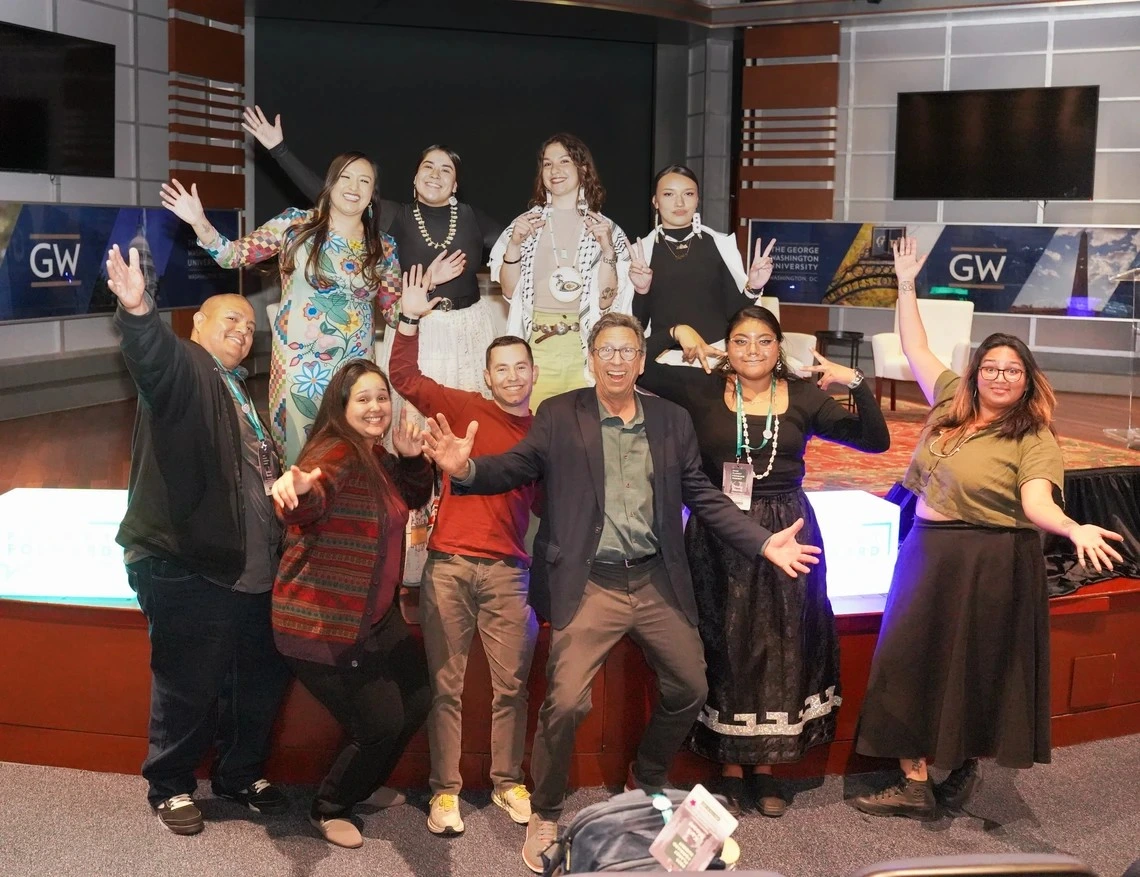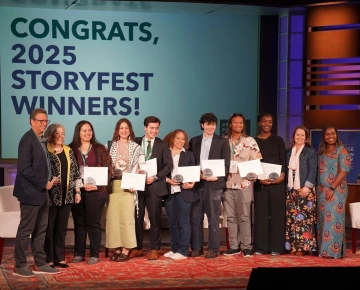Indigenous Correspondents Program Students Make Their Mark at the 2025 Planet Forward Summit

ICP students, program co-founders Alexander Cotnoir and JoRee LaFrance, and Indigenous Editor and Story Mentor Ivey Camille Manybeads Tso (Diné), attend the 2025 Plane Forward Summit, which was founded by Emmy Award-winning journalist Frank Sesno (center).
Torran Anderson, Indigenous Resilience Center
Capping off their participation in this year’s Ilíiaitchik: Indigenous Correspondents Program, six ICP students traveled to Washington, D.C., in April to participate in the 2025 Planet Forward Summit at George Washington University.
As part of the trip, ICP students participated in storytelling presentations and workshops that explored various aspects of environmental journalism. This year, two ICP correspondents received national Planet Forward Storyfest awards, which celebrate inspiring environmental storytelling from contributing undergraduate and graduate students.
Storyfest winners receive a summer 10-day voyage to the Galápagos Islands to explore the extraordinary biodiversity of the archipelago and gain valuable insight into conservation efforts at the frontlines of climate and ecological change.

ICP students and 2025 Storyfest Winners Karli Moore and Sagen Lily Quale (third and fourth from left) accept their awards during the 2025 Planet Forward Summit.
Torran Anderson, Indigenous Resilience Center
Karli Moore, a PhD student in environment and resources at Stanford University, received the Spotlight Award for “A Native farmer growing a native crop: The role of fiber hemp in a more sustainable future.” Sagen Lily Quale, a master’s student in agroecology at the University of Wisconsin-Madison, won the Fan Favorite Award for “Seeding stories: Manoomin and Anishinaabeg relations.”
Another two ICP stories were finalists in additional categories. Arizona State University emergency management master’s student Joshua Massey’s “Embracing fire: Integrating tradition and innovation in wildland fire management on Indian reservations” was a finalist for Best Written Story. Meanwhile, Indigenous People’s Law graduate from the University of Oklahoma Angel Stickman’s “Understanding the salmon crisis in Alaska” was a finalist for Best Social Media Video.
“It’s exciting to see the students’ stories being recognized amid a national pool of students at the Planet Forward Summit, especially because their stories are deeply rooted in connection to place and their communities,” ICP co-founder Alexander Cotnoir said. “These students pour their heart and souls into telling stories that not only move the planet forward, but also honor their communities in the process.”
To kick-off Planet Forward, U of A journalism master’s student and ICP correspondent Trinity Norris presented the opening reflection. Later that day, ICP hosted a “Centering Communities” panel discussion, moderated by Indigenous Editor and Story Mentor Ivey Camille Manybeads Tso (Diné) and featuring Moore and Massey alongside Robyn Kay Iron, journalism student at the University of Montana, and Taliyah Medicine Horse, horticulture student at Chief Dull Knife College. Together, the panelists discussed why including Indigenous voices in storytelling and respecting Indigenous perspectives is important.
"I feel like the most objective I can be is by acknowledging the subjectivity," Moore said, discussing her interview with her father for her award-winning story. "Where you end up on the spectrum is okay as long as we don't try to negate people who choose another positionality because I think it takes all of us in our own way to tell the stories."
On the second day of the summit, Ivey Camille Manybeads Tso and Sagen Lily Quale facilitated the workshop “Indinema: Ways to Promote Power in Storytelling.” During the workshop, they highlighted the importance of breaking away from Western standards of lighting, sound, colors, language, and other visual storytelling techniques to embrace cultural nuance and highlight the individuality of people and different communities featured in stories.
“These students pour their heart and souls into telling stories that not only move the planet forward, but also honor their communities in the process.”
-Alexander Cotnoir, ICP Co-Founder.
While in D.C., ICP students also explored local national monuments and met with members of the Smithsonian National Museum of Natural History’s Exhibits and Writing teams to learn about how they design compelling stories to convey environmental issues and spur visitors to action.
Co-founded by U of A environmental science PhD student JoRee LaFrance and then George Washington University master’s student Alexander Cotnoir, the Ilíiaitchik: Indigenous Correspondents Program supports greater Indigenous student participation in multimedia environmental communication spaces. A collaborative effort between Planet Forward at George Washington University, the U of A’s Indigenous Resilience Center, and AIR Education Initiatives, ICP centers Indigenous student voices and brings broader perspectives to environmental storytelling.
Students with an interest in environmental science-related fields, finding and sharing resilient, innovative solutions, and effective storytelling in media spaces are encouraged to apply to become part of the 2025-26 Indigenous Correspondents Program cohort.
